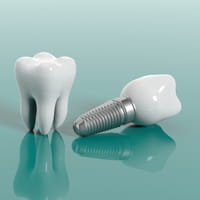
BACKGROUND: Mr W is a 64-year-old businessman with two dental implants in the lower left quadrant. These were provided by a specialist oral surgeon – Mr S – on referral from the patient’s regular GDP.
A letter has been sent to the Dental Complaints Service (DCS) by Mr W complaining about the treatment provided by Mr S. The patient states that one of his implants is “unstable” and that over the last few years he has attended Mr S on five occasions to have it “tightened”. Each visit has involved costs in excess of £100 but the problem has yet to be resolved.
Mr W demands that he be refunded for the cost of the implant and all subsequent “adjustments”.
The DCS has referred the complaint back to Mr S for local resolution.
ANALYSIS/OUTCOME: Mr S contacts MDDUS for assistance in dealing with the complaint. He drafts a letter of response and forwards it to a dental adviser for review. In the letter he first expresses regret at Mr W’s dissatisfaction with his dental care and welcomes the chance to clarify the treatment provided.
Mr S recounts in the letter how two implants were placed in the lower left quadrant without incident or complications. Impressions were taken for restoration and linked crowns were fixed to abutments – the superstructure secured by cement to the rear abutment and a gold screw on the mesial. Mr S explains that using a screw and soft cement facilitates easier access for necessary upkeep.
Mr S further explains that it was not an “unstable” implant that has required further treatment; it is the gold screw fixing the crown to the mesial abutment that has periodically needed tightening. This would be considered regular maintenance that might be expected with an implant/crown of this type and can be carried out by most GDPs on a routine basis. For this reason Mr S states that he cannot be expected to refund treatment costs.
The letter further advises that Mr W has the right to take the matter to the ombudsman and contact details are provided.
No further contact is made by Mr W in regard to the complaint.
KEY POINTS
- A clear explanation and confirmed understanding by patients of treatment decisions can often forestall complaints and claims.
- An expression of regret at patient dissatisfaction does not amount to an admission of liability.
This page was correct at the time of publication. Any guidance is intended as general guidance for members only. If you are a member and need specific advice relating to your own circumstances, please contact one of our advisers.
Save this article
Save this article to a list of favourite articles which members can access in their account.
Save to library